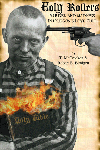Holy Rollers: Murder and Madness in Oregon's Love Cult
by T. McCracken and Robert B. Blodgett
CHAPTER TWENTY
Testimony
***
DRAMATIC TESTIMONY OF RUINED HOME, DEBAUCHED WIFE AND DEBASED SISTERS
Headline, Seattle Star, July 3, 1906
*** 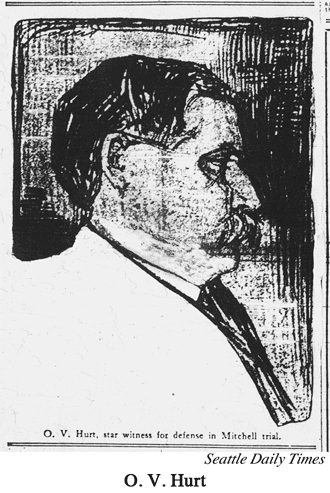
Not surprisingly, the courtroom was overflowing with spectators when O. V. Hurt was called to testify on Tuesday. The temperature outside was in the mid-nineties, making it almost unbearable inside. Judge Frater announced that, thereafter, only those who could find seats would be allowed in. As long as the heat wave continued, people would no longer be allowed to stand in the rear aisle or to sit on the window sills.
O. V., described by the Oregonian as “stockily built, intelligent and kindly of appearance,” began his testimony: “I met the defendant, Mr. Mitchell, in Portland, the last week in March. I told him Creffield was out of prison and described to him the effects of his power over the womenfolk.”
O. V.’s testimony, and the testimony of many others, was liberally sprinkled with phrases like “I told George Mitchell” or “when I talked the matter over with George Mitchell, I told him” or “all this I told George Mitchell.” On the stand O. V. was supposedly repeating a conversation he had had with young Mitchell, a conversation in which he supposedly told young Mitchell Creffield’s story from beginning to end.
This testimony could not be dismissed as hearsay because it was not offered as proof of Creffield’s actions but as proof of young Mitchell’s state of mind when he killed Creffield.
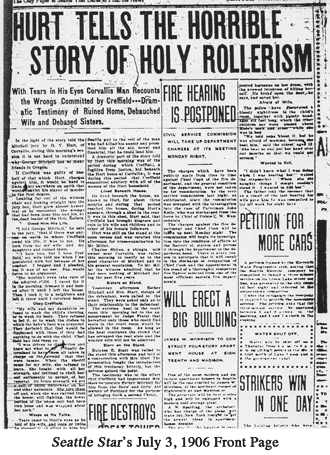 Can we, the defense counsel help it if the jury
after hearing this testimony, might reach a verdict that Creffield was a fiend
who deserved to die?
Can we, the defense counsel help it if the jury
after hearing this testimony, might reach a verdict that Creffield was a fiend
who deserved to die?
Tears filled O. V.’s eyes most of the while he was on the stand, especially when he spoke of his wife Sarah being committed to the insane asylum. Several times he paused and fought for self-control, and at other times he leaned far out of the witness chair, looked straight into the jury box, and grew almost hysterical as he recounted the wrongs done him. Bit by bit, the causes of the ruination of his family were exposed. His story was one of grief and shame, of how Creffield brought devastation, division, and insanity to a heretofore happy family of which love had been the keystone.
“That man [Creffield], gentlemen of the jury, ruined my life,” O. V. said as he concluded his testimony. “He ruined my home and my family. I told Mitchell the man ruined his sisters.”
“If Creffield was guilty of one half of that which Hurt charges against him,” the Star said, “it would be hard to find a jury anywhere on earth that would convict his slayer of murder in the first degree.”
Throughout O. V.’s testimony Mackintosh and Miller repeatedly objected to questions or asked that statements be stricken from the record. O. V. had implied in his testimony that when he told young Mitchell Creffield’s story, it came as news to him, as if perhaps George had spent the last few years hiding in a hole under a house--things like that had been known to happen in Oregon.
These objections were based on the fact that it was highly improbable that stories--true or not--of the doings of Creffield came as news to anyone in Oregon in March of 1906--especially to the defendant, and that it was highly improbable that this one conversation resulted in young Mitchell having an epiphany.
Oh, so that’s why so many of my friends were committed to the insane asylum in 1904, and that’s why Esther is now running around saying she’s going to be mother of the next Christ. I must go and kill this brute who has debauched my sisters!
Although Judge Frater sustained most of the objections, the prosecution wasn’t helped. The jury looked agitated that Mackintosh and Miller were indirectly implying that O. V. Hurt--an “intelligent and kindly” man who had suffered so many wrongs--was not being completely truthful. Not to mention that the repeated interruptions were hindering the flow of the telling of this revolting but riveting story.
After O. V.’s testimony, upon seeing O. V. talking to George, Mackintosh said privately: “Any man could be proud of a friend like old man Hurt. He’s one of the finest old men I ever met.” Mackintosh and Miller meant no disrespect to O. V. when making their objections. They were just doing their duty.
“It did not matter to him [Mackintosh] whether the reward be the political oblivion of the dog catcher’s wagon or the honor of a seat upon the bench of the superior court which he was addressing,” the Daily Times said. “He performed his duty as he saw it with the law of the land behind him and a conviction that he was doing his full duty in his heart.”
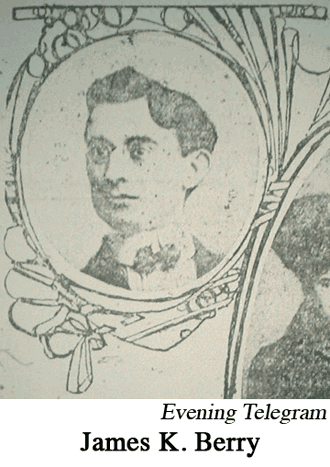 Despite the heat, few
spectators left the courtroom during the lunch recess. They didn’t want to miss
anything, as Donna Starr’s husband, Burgess, was scheduled to testify in the
afternoon. During the recess Burgess, described by the Telegram as “a man of robust stature and intelligent appearance,”
sobbed with his head between his hands, declaring that “he would give his soul
up to damnation a thousand times if he might thereby restore his family to the
happy state in which it was before Creffield’s advent.”
Despite the heat, few
spectators left the courtroom during the lunch recess. They didn’t want to miss
anything, as Donna Starr’s husband, Burgess, was scheduled to testify in the
afternoon. During the recess Burgess, described by the Telegram as “a man of robust stature and intelligent appearance,”
sobbed with his head between his hands, declaring that “he would give his soul
up to damnation a thousand times if he might thereby restore his family to the
happy state in which it was before Creffield’s advent.”
Burgess’s testimony began: “Two or three years ago I first mentioned to George Mitchell that Esther, his sister, was attending the meetings of Creffield, and I told him that I did not think it was an appropriate place for her to go.” He covered many of the same points O. V. had covered, and like O. V., he wept on the stand. He was continually drying his cheek with a handkerchief, especially when he testified that Donna, his wife, was “the most fanatical of all Creffield’s followers.” When Burgess spoke of Donna’s going to the coast to join Creffield, and abandoning his children--George’s nieces and nephew--George, for the first time since the trial started, laid his head on his arms and cried.
“I had a talk with George Mitchell when he was in the hospital, early in April this year,” Burgess concluded with. “He seemed ‘off’ at that time, and told me he was going to kill Creffield.”
On cross-examination, Miller asked “Does it seem commonplace to hear a man talk about killing another?”
“No.”
“Why then didn’t you tell the officers of the law if you believed Mitchell to be insane and dangerous?”
“I did not believe George would do what he said he would,” Burgess replied. “George told me there would be no trouble, as he was commanded by God to remove Creffield.”
What else could he have said? Right after O. V. Hurt informed me that George had succeeded in killing Creffield, I looked at my own revolver, and cried: “Oh, if he had only been seen in Portland!”
Both Lewis Hartley and Edwin Baldwin, described by the Post Intelligencer as “two men in the prime of their lives, perhaps beyond it--men of an age when carefully considered judgment is supposed to have conquered the rash impulses of youth,” testified that they had been ready to kill Creffield on sight. Lewis testified to telling young Mitchell about following Cora and Sophie, his wife and daughter, to the coast.
“My object, gentlemen, to be frank with you, was to kill Creffield,” he said. “Having no gun with me, I went to a second-hand store and bought a cheap weapon. By mistake or trickery, I don’t know which, the dealer sold me a center-fire revolver and rim-fire cartridges. When the party took a boat to cross the bay to South Beach I drew a bead on Creffield. Had my cartridges been all right that would have ended the matter. The gun snapped and Creffield got away. . . . Later, when I met Mitchell, also hunting for Creffield to kill him, I told him how I had missed the Roller. He did not seem surprised nor displeased. . . . He said the reason I had failed was because God had left it for him to kill Creffield. He seemed utterly out of his mind.”
Poor Mackintosh and Miller. What sort of cross-examination could undo the damage of such testimony?
A dignified man admits on the stand, under oath, with no prompting, no trying to hide behind the Fifth Amendment that he not only wanted to kill Creffield, but that he tried to kill Creffield. His only regret, he says, is that he failed to kill Creffield!
Edwin Baldwin testified to seeing young Mitchell at the Albany railroad station in May when both of them were looking for Creffield. He testified that at that time he told young Mitchell about his daughter Una and what Creffield had done to her, how he, her own father, “would remove her from the earth, rather than permit her to ever again get under his control.” He testified that he begged young Mitchell for the privilege of killing Creffield.
Edwin said that, in his opinion, young Mitchell was “crazy” at the time, as he would talk only on one subject--that of the harm done his sisters and the necessity of losing no time in fulfilling his destiny of killing Creffield. “I tried to show Mitchell,” Edwin said, “how much better it was that I, in my old age, with but, at best, only a few more years to live, should find Creffield, and remove him from the earth, than that he should persist in his determination.”
“Testimony of this kind,” the Oregonian said, “coming from men of reserved and conservative manner, had a profound effect upon the jury.”
Miller, on cross-examination, sought to discredit Edwin’s testimony by asking him why, if he seriously thought the defendant was insane, he didn't try to disarm him. Some in the courtroom looked at Miller with incredulity.
A man says that he’d rather remove his daughter from the earth than permit her to ever again get under Creffield’s control, and now the prosecution is asking him why he didn’t disarm the defendant if he thought he was insane? Has everyone gone insane--defendant, witnesses--even the assistant prosecuting attorney for King County?
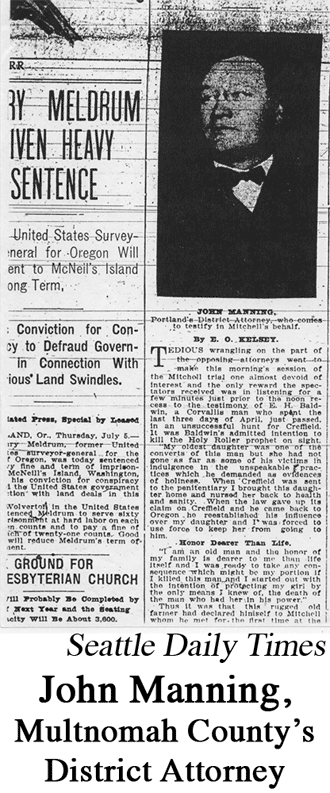 “Sir, you ought to be able to
get fine clothes without grafting in this case and trying to punish this
innocent boy,” one of the rabble, an elderly Baptist church worker, said to
Miller afterwards. “Your efforts at this trial will never do you any good, and
you will live to be sorry for what you are trying to do.” Miller, dressed in an
immaculate blue suit, tan vest, highly polished shoes, and a straw hat of the
very latest style, raised his hat and stood for a moment waiting for a further
attack from the woman. When none came, Miller replaced his hat, and bade her
good day.
“Sir, you ought to be able to
get fine clothes without grafting in this case and trying to punish this
innocent boy,” one of the rabble, an elderly Baptist church worker, said to
Miller afterwards. “Your efforts at this trial will never do you any good, and
you will live to be sorry for what you are trying to do.” Miller, dressed in an
immaculate blue suit, tan vest, highly polished shoes, and a straw hat of the
very latest style, raised his hat and stood for a moment waiting for a further
attack from the woman. When none came, Miller replaced his hat, and bade her
good day.
The woman who had chastised Miller was only one of George’s many female admirers. Like Creffield, he was getting quite a following--although his was viewed as being a lot healthier.
Better to be entranced by a murderer than someone claiming to be the second Christ.
“The interest of women in the case is becoming marked,” the Oregonian noted. “This afternoon there were more women than men in the courtroom, and all listened eagerly to the revolting testimony adduced. . . . While the testimony seems to be the principal attraction, Mitchell is also a drawing card, and there is a continual craning of necks for a better view of him.”
And not all of his female admirers were old. Speculation on the identity of one beautiful young woman dressed in a white suit who at every noon recess presented George with a large bouquet of roses provided the attorneys and the other officers of the court a welcome diversion. No one knew who she was, but, naturally, it was assumed she was “a young women of high character and standing.” This had the makings of a wholesome romance--far different from the perverted affairs Creffield had had.
It became customary for the deputy sheriff who escorted George to and from the jail to allow him a few minutes conversation with the mystery woman, and George always wore on his lapel one of the roses she had given him. During the day he would frequently turn to see if she was there. And she always was. And she always responded by smiling at him.
James Berry, described by the Telegram as “a well-to-do business man,” and one-time fiancée of Maud Hurt, now become the Widow Creffield, testified that he “told Mitchell” about how he himself had been a supporter of Creffield’s. That was until “he told me that he needed money to build a tabernacle,” James testified. “He told me that I must sell all my valuables, including my automobile, and give the money to him. . . . Then Creffield and I had a falling out, as I would not do the things he said.” After that, James said, Creffield loudly threatened that God would “smite” him.
What tame testimony this was after stories about a man having sexual relations with children in front of their mothers and then having sexual relations with mothers in front of their children. A well-to-do businessman being asked to give up an automobile--even a new $690 Oldsmobile--was hardly the same sort of villainy. But it did show what an all-around scoundrel Creffield was.
Lynn county deputy sheriffs John Catlin, described by the Daily Times as “a little man well along in years . . . a veritable Dogberry . . . also garrulous,” and George Van Dran, described only as “an Albany hotel-keeper,” also testified to seeing young Mitchell at the train station. Both said they believed he was “crazy.” They said they urged him to eat, but he had said he couldn’t until he’d accomplished his mission.
John spoke of “turrible heavy rains in southern Oregon,” of late trains, and of many other incidents that fixed in his mind the day the defendant was in Albany.
on cross-examination, Miller asked John why, if he believed the defendant was crazy and intent on killing a man, he hadn't detained him, or at least searched him. “That certainly should have impressed you as being your duty as an officer of the law,” Miller said.
“Young man,” Catlin snapped, “I, with my twenty-five years as an officer, believe that I know what is my duty. In that time a man has many experiences, and I have learned that it does not do to arrest or search every man who acts kind of crazy.”
Even judge Frater couldn’t help chuckling at this.
Dr. F. W. Brooks, said by the Daily Times to be “one of the most prominent physicians in Portland,” and Harriet Hager, a nurse at Portland’s Good Samaritan Hospital, gave testimony similar to one another’s. Both testified that they had known young Mitchell for a number of years, that “he was a man of good reputation,” that they had attended him when he had the measles in April, that he was extremely weak mentally and physically when left the hospital, and that he “had left the sanitarium long before he should have.” They both testified that while young Mitchell was suffering from a fever he claimed his mother’s spirit had revealed to him that he had to “bring this unholy influence of Creffield to a close.”
And like everyone else who heard George threaten Creffield, they said they did nothing to stop him.
What could they have been expected say? The spirits, as we testified, didn’t reveal to young Mitchell “the manner” in which he was to accomplish this mission. How could we have known he was going to gun the man down?
Mary Graham and William Gardner (no newspapers gave descriptions of them), matron and superintendent and of the Boys’ and Girls’ Aid Society, both testified that, in their opinion, “Esther Mitchell was crazy.” Gardner came to Seattle a few days before expected, and for some reason Judge Frater allowed him to sit at the defense’s table with young Mitchell and his attorneys. Usually all witnesses waited outside the courtroom until they were called to testify.
Mary Graham testified that “Esther was incorrigible in her Holy Roller practices, insisting upon rolling on the floor and praying until late in the night.” Graham also said she was afraid Esther “might be seized with a hallucination that God had commanded her to kill some of the children or keepers.”
Gardner testified that young Mitchell came to him to ask that special care be taken of his sister, as Creffield was planning to abduct her from the Aid Society. Gardner then said that when he asked young Mitchell whether he wanted to see Esther, Mitchell became excited, and cried: “No, I cannot stand to see her! I never want to see her while she is in that condition!”
On cross-examination, Miller asked: “Mr. Gardner, you remember my visit to you at Portland some weeks ago, do you not?”
“Yes.”
“Am I mistaken in my impression that you distinctly told me at that time that you had never seen George Mitchell?”
After a moment Gardner replied: “Yes, you are in error in that respect.”
The mayor and two other men from Newberg, George’s childhood hometown, were called to testify to the streak of insanity that ran through the Mitchell family. All of them were well acquainted with Charles Mitchell, young Mitchell’s father. Morris asked each of them similar questions, essentially about any “oddities or eccentricities” they might have noticed about the elder Mitchell. Miller objected to the testimony. It was one thing, he said, to show a family history of insanity, another to show a family history of “eccentricities.” The objections were sustained. The only testimony the men succeed in getting before the jury was that “the defendant’s reputation in Newberg was good.” But, of course, everybody by now already suspected that.
Seven of George’s friends--including Anna Hager and Louis Sandell, brother of Mollie Hurt--were called to testify about young Mitchell’s insane behavior shortly before the murder. They all testified that George had always been a man of “good character” until shortly after he left the hospital. Then his actions were so peculiar that, as Louis Sandell said, “Mitchell was crazy as a loon.”
On cross-examination of Anna Hager, Miller asked whether she herself wasn’t a spiritualist.
Yes, she was.
So it was not her opinion that the belief in spirits constituted “mental unsoundness”?
“No.” It was her opinion that the problem George had was that “the spirits with whom he conversed with were not the proper kind of spirits.”
Not the proper kind of spirits? Miller asked no further questions.
As none of George’s friends could be classified as insanity experts, most of their testimony about his mental unsoundness--his looniness--was found to be inadmissible and was ordered stricken from the record.
And so the defense called an insanity expert--or as a headline in the Post Intelligencer reported, “MITCHELL INSANE EXPERT TESTIFIES.” Actually, five “experts” testified: Dr. Donald A. Nicholson, “an expert in nervous diseases”; Dr. W. I. Miles, “one of the foremost medical men in the city”; Dr. Arthur C. Crookall, onetime superintendent of the Minnesota State Asylum for the Insane and now a “Seattle medical expert”; Dr. John Wotherspoon, “an insanity expert”; and Dr. Wright, yet another.
Shipley asked the doctors hypothetical questions about an imaginary man behaving as George Mitchell had behaved. What sort of diagnosis would they make of such a man?
“I would say such a man was possessed with a delusion,” Dr. Nicholson said, “and had lost control of himself; that as a result of this delusion he was insane. The fact that he had expressed this desire for such a long period, in opposition to the arguments of others, would show he had a delusion. The belief in the direction of God for one man to kill another is pretty generally agreed among authorities not to be the working of a normal mind.”
Dr. Nicholson also stated that the danger such an imaginary man believed his sisters were in, especially in light of their past connection with the Holy Rollers, might tend to make him insane.
Shipley then asked questions about the probable mental condition of other members of such an imaginary man’s family. Dr. Nicholson stated that he would expect to find similar mental conditions, or “dispositions,” although not necessarily similar actions, in them.
On cross-examination of Dr. Miles, Miller said: “The founder of the Mormon church claimed that he had received a revelation from God, and that he had been directed by this divine inspiration.” (Joseph Smith, founder of the Mormon church, said that he had had a vision that Jesus Christ told him not to join an established church because all churches were wrong, and later Moroni, an angel, told him that the story of the first North Americans was engraved on a buried plate. Smith claimed to have found the plate and in 1830 published his translation, the Book of Mormon.)
“Was that an insane delusion?” Miller asked Dr. Miles.
“If he actually believed it,” Dr. Miles answered, “it was.”
Miller said that there were some people who believed that prayers are answered, and ills are cured by prayer. “Do you regard such beliefs as insane delusions?”
“If adhered to beyond the point of reason, it is,” Dr. Mills said, adding that “those holding such opinions were entitled to their beliefs, and so long as they did not carry them to the point of absurdity, the ‘divine’ healers could not be classed as demented.”
Miller, formed his own hypothetical situation. “A certain sect believes the Christ has not yet appeared, while another insists that he came in Jesus. . . . Pick the insane delusion.”
“There was none,” Miles held.
Afterwards another elderly woman cornered Miller as he left the court. “Are you not ashamed of yourself in trying so hard to indict that boy who did a brother’s duty in trying to defend his sister against a reptile?” she wailed.
When John Manning, Multnomah County’s district attorney in Portland, stepped up to George Mitchell and warmly shook his hand in Judge Frater’s courtroom, many realized it was an unusual sight. A public prosecutor didn’t appear in the interest of a man accused of cold-blooded murder every day. Manning’s action produced a murmur of satisfaction and approval among young Mitchell’s friends in the courtroom--meaning all of the spectators--all of the rabble.
If George Mitchell had killed Creffield in Multnomah County I would never have issued an indictment against him [Manning had said beforehand]. In fact, even if I had been willing to prepare an indictment there could have been found no complaining witness in that part of the country who would have attached his or her name to the complaint.
There is no possibility that Mitchell or any other man who would have had the nerve to put Creffield out of the way would have ever had to suffer any penalty for an act that would only have been considered in the light of a public benefit. No court in the state of Oregon would ever have convicted Creffield’s slayer of any criminal act in removing such a beast from the face of the earth.
“The appearance of Mr. Manning on the stand,” the Oregonian commented, “was the signal for opening hostilities.” And indeed it was. After stating his name and occupation, Morris asked Manning to tell the jury what he knew of Creffield’s power over George’s sister, Donna Starr.
“Objection,” Miller said, practically before Morris finished asking the question. “The material is irrelevant, immaterial and incompetent.”
“Sustained!” Judge Frater said, and dismissed Manning from the stand.
M. P. Burnett, Sheriff of Benton county, was then called and after the usual preliminaries was asked a question similar to that asked Manning. Not surprisingly, Miller objected. Judge Frater then expressed annoyance at Morris’s persistence in asking questions that he had already ruled against. What followed was one of the liveliest legal skirmishes in a trial full of lively legal skirmishes, a skirmish that ended with Morris stating that he would “insist upon entering every scintilla of evidence,” that the defense intended “to overcome every obstacle put in their way by the state--even if it takes all summer!”
And who knows--if Judge Emory hadn’t been murdered the next day, the trial might have gone on all summer.
***
And when they shall have finished their testimony, the beast that ascendeth out of the bottomless pit shall make war against them,
Revelation 11:7
![]() Chapter 19: An Inherited Streak of Insanity
Chapter 19: An Inherited Streak of Insanity
![]() Chapter 21: Yet Another Page One Murder
Chapter 21: Yet Another Page One Murder
***
Some of the newspaper articles that are sources for this chapter:
July 1906: Hurt Testifies of Debauched Wife and Debased Sisters
***
Chapters from
Holy Rollers: Murder & Madness in Oregon's Love Cult
Part 1: The Seduction
Chapter 1: Trust Me, Brothers And Sisters
(Life Before Creffield [B.C.])
Chapter 2: God, Save Us From Compromising Preachers
(Creffield's Preachings)
Chapter 3: The Flock
(Profiles of the Holy Rollers Were)
Chapter 4: The Holy Rollers
(Things Start to Get Wild on on Kiger Island)
Chapter 5: Housecleaning
(There's a Sacrificial Bonfire)
Chapter 6: Community Concerns
(Officers Visit)
Chapter 7: Esther, The Chosen One
(Creffield Plans to Marry 16-Year- Old)
Chapter 8: Tar and Feathers
(The Men of Corvallis Act)
Chapter 9: Sane People Don’t Go Bareheaded
(Holy Rollers are Committed to the Asylum)
Chapter 10: More Beast Than Man
( Creffield is Arrested)
Chapter 11: God Will Plead Creffield's Case
(Creffield in Court)
Chapter 12: Scandal
(Shocking Testimony at the Trial)
Chapter 13: Calm Before the Storm
(The Holy Rollers Resume their Lives)
Chapter 14: Giving Up The Ghost
(Men are Gunning for Creffield)
Part Two: The People V. Creffield
Chapter 16: The Widow Creffield
Chapter 19: An Inherited Streak of Insanity
Part Three: The Madness
Chapter 23: Seeking Reconciliation
Chapter 24: Another Holy Roller Page One Murder
Chapter 25: What Can Papa Do For You?
Chapter 26: Human Life is Too Cheap In This Community
Chapter 30: The Final Chapter
(What Happened to Everyone Afterwards)
The Epilogue
(Heaven's Gate)
Newspaper Articles about Creffield & the Holy Rollers
1897-1903: B.C. (Before Creffield)
October to December 1903:Holy Rollers Burn Furniture & Pets
January to March, 1904: Holy Rollers Tarred and Feathered
April to June 1904: Holy Rollers are Committed to the Asylum
July 1904: Creffield is Found & Arrested
September 1904: Creffield's Trial
April 1906: Men are Gunning For Creffield
May 1906: Creffield is Murdered, Murderer is Considered a Hero
May 1906: Holy Rollers Found Starving Near Heceta Head
June 1906: George Mitchell's Trial Begins
July 1906: Hurt Testifies of Debauched Wife and Debased Sisters
July 1906: Esther Mitchell Kills Her Brother
August to October 1906: Seattle Prepares for another Big Trial
November 1906: Maud Hurt Creffield Commits Suicide
April 1909-August 1914: Esther Leaves the Asylum
1953 Stewart Holbrook's Murder Without Tears
1951Startling Detective Magazine, Nemesis of the Nudist High Priest
***
